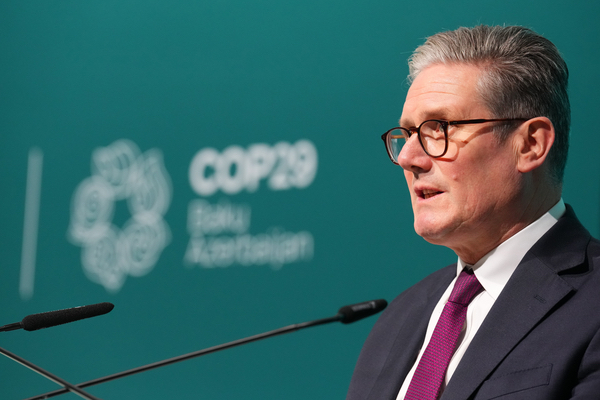By ESG Analyst Cameron Toy Kluger

Carl Court/Getty Images
COP29 Commitments
The looming arrival of a second Trump presidency has pushed discussions and promises from several nations at the 29th United Nations Climate Change Conference, or COP29, currently being held in Baku, Azerbaijan. The foremost of these has come from the United Kingdom, where on day 2 Prime Minister Keir Starmer reinforced his nation’s commitment to driving a transition from fossil fuels to green energy: “Our mission to make Britain a clean energy superpower will fire up our industrial heartlands and break down barriers to growth in our hard-working towns and cities.”
Starmer emphasized his desire to see the UK as a leader in climate action, announcing an ambitious new target to reduce the UK’s carbon emissions by 81% by 2035 compared with 1990 levels. This target represents the greatest reduction promised by any industrial economy and stands against the sharp downturn in regulation and emissions reductions expected as the US braces for a second Trump term.
Policy and Action
The UK also announced the Clean Industry Bonus, an incentive of £27 million per gigawatt for offshore wind developers to invest in Britain’s industrial regions. The bonus has already begun generating investment, with ScottishPower sealing a $1.3B wind turbine teal with Siemens Gamesa that promises to power nearly 1M homes and create over 1,300 jobs. The government also unveiled a finance plan to raise $75B in investment for clean energy in poor countries which launched recently on the London Stock Exchange.
Looking Forward
Starmer’s words are more than just an overarching promise. The PM’s announcement sets the stage for the UK to be positioned as a haven for private sector investment in the clean energy transition at a time when tax incentives for renewables in the US are likely to be rolled back over the coming few months.
However, there are still huge obstacles that will face the 2035 target. According to the National Energy System Operator, such a target will require an estimated $80B in investment as well as the doubling of land wind power and a tripling in solar. The UK government has already taken several tangible steps to facilitate this transition, pledging to halt new oil and gas exploration in the North Sea and ending a ban on wind energy projects on land. However, the optical challenge remains for Britain to prove that a clean energy transition exists that can grow the economy and jobs while reducing carbon.
Reactions from other nations and organizations toward the UK’s new commitment have been altogether positive at COP29. Still, climate advisors emphasize that the target should be considered a ‘starting point, not finish line’ to further climate action. Specifically, many are looking to rich countries to create financial mechanisms to protect poor countries from the effects of climate change and facilitate an increase in international collaboration.
References
- At COP29, Keir Starmer Announces the UK’s Ambitious Climate Targets—The New York Times. (n.d.). Retrieved November 14, 2024, from https://www.nytimes.com/2024/11/12/climate/keir-starmer-uk-emissions.html
- Gayle, D., & Evans, A. (2024, November 12). UK commitment to cut greenhouse gas emissions must be ‘starting point, not finish line’, climate advisers say – Cop29 day two, as it happened. The Guardian. https://www.theguardian.com/environment/live/2024/nov/12/world-leaders-to-speak-as-cop29-resumes-live-updates
- Hawksworth, A. (2024, November 14). Fairtrade responds to UK’s COP29 “ambitious” new climate goal. Global Coffee Report. https://www.gcrmag.com/fairtrade-responds-to-uks-cop29-ambitious-new-climate-goal/
- News, E. S. G. (2024a, November 12). CIF’s $75 Billion Clean Energy Bond Program Launches on London Stock Exchange. ESG News. https://esgnews.com/cifs-usd-75b-clean-energy-bond-program-launches-on-london-stock-exchange/
- News, E. S. G. (2024b, November 13). UK Prime Minister Starmer Commits to Cutting Emissions by 81% by 2035 at COP29. ESG News. https://esgnews.com/uk-prime-minister-starmer-commits-to-cutting-emissions-by-81-by-2035-at-cop29/
